Ghana holiday, Kingdoms of Gold
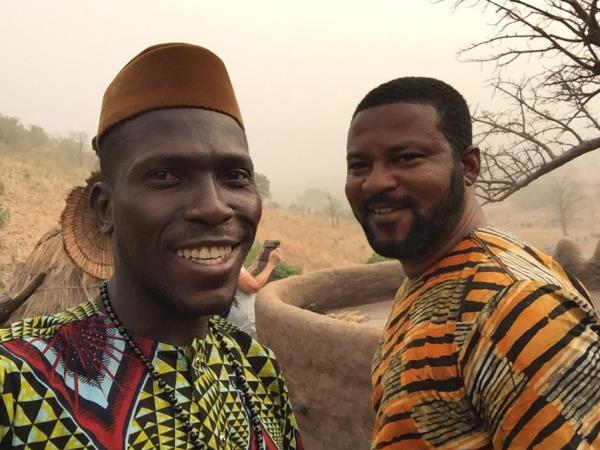
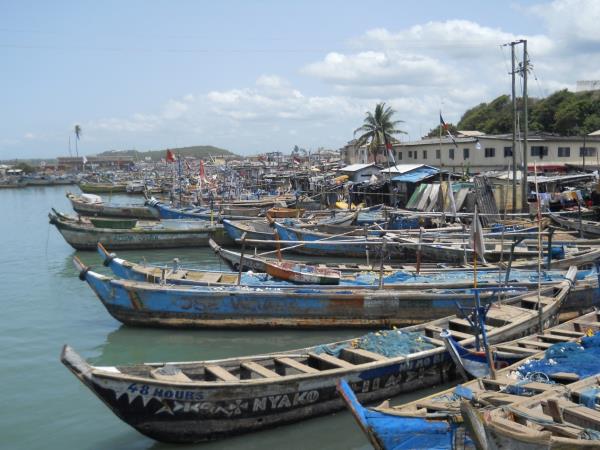
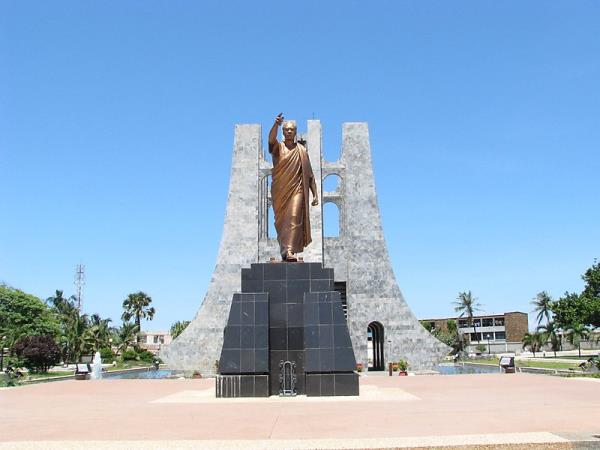
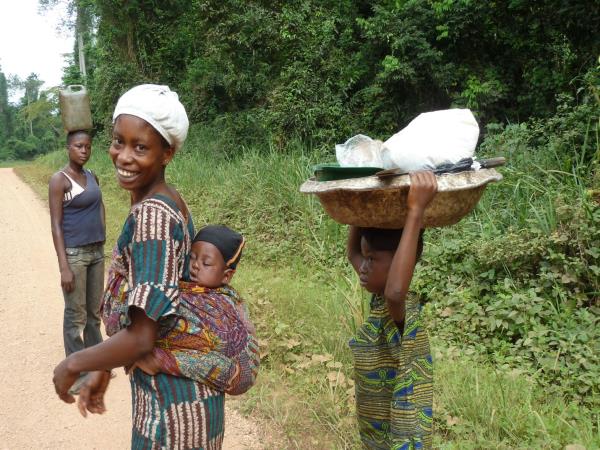
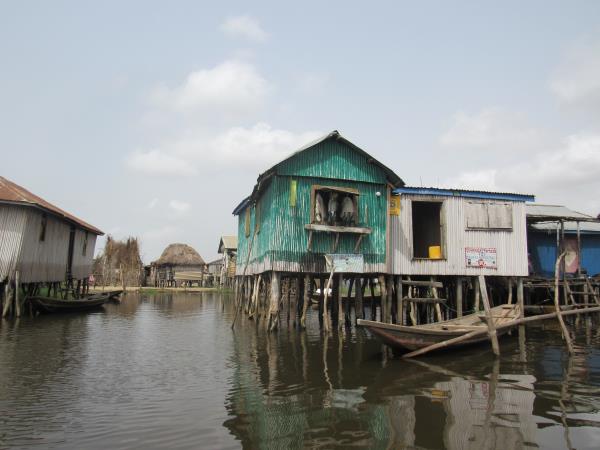
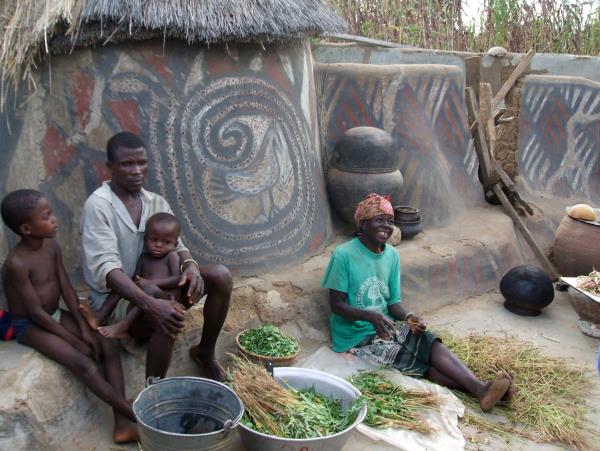
Description of Ghana holiday, Kingdoms of Gold
Often considered West Africa’s most welcoming and vibrant nation, Ghana offers an array of wonderful experiences on this small group adventure. Tap into a vibrant pulse of Ghanaian life in the exciting capital Accra, then visit remote villages with strong ancestral traditions. Enjoy shifting landscapes, from savannah to forest plus beautiful tropical shores – and contrast the startling rock formations known as 'the cave of the oracle' with the cooling rush of the Wli waterfalls.
You'll learn about both ancient African kingdoms and the country's European colonial heritage, visit the home of sacred monkeys, meet women declared 'witches', and learn about the tragic history of slavery that casts a historic shadow over the beautiful coast in places like Elmina.
As well as museums, the capital Accra offers the charms of its atmospheric old quarter and the celebrated modern tradition of craftsman who make arguably the world's most striking coffins! In Elmina, meanwhile, contrast Africa's oldest European building - St George’s Castle – with the town's unique Posuban shrines, made by traditional ‘asafo’ societies.
Visit Ashanti homes in Kumasi and Dagomba village huts, as well as the remarkable geometrical painted houses of the Gurunsi people. And if he's free, you may even meet the king of one of Ghana's tribes!
Map
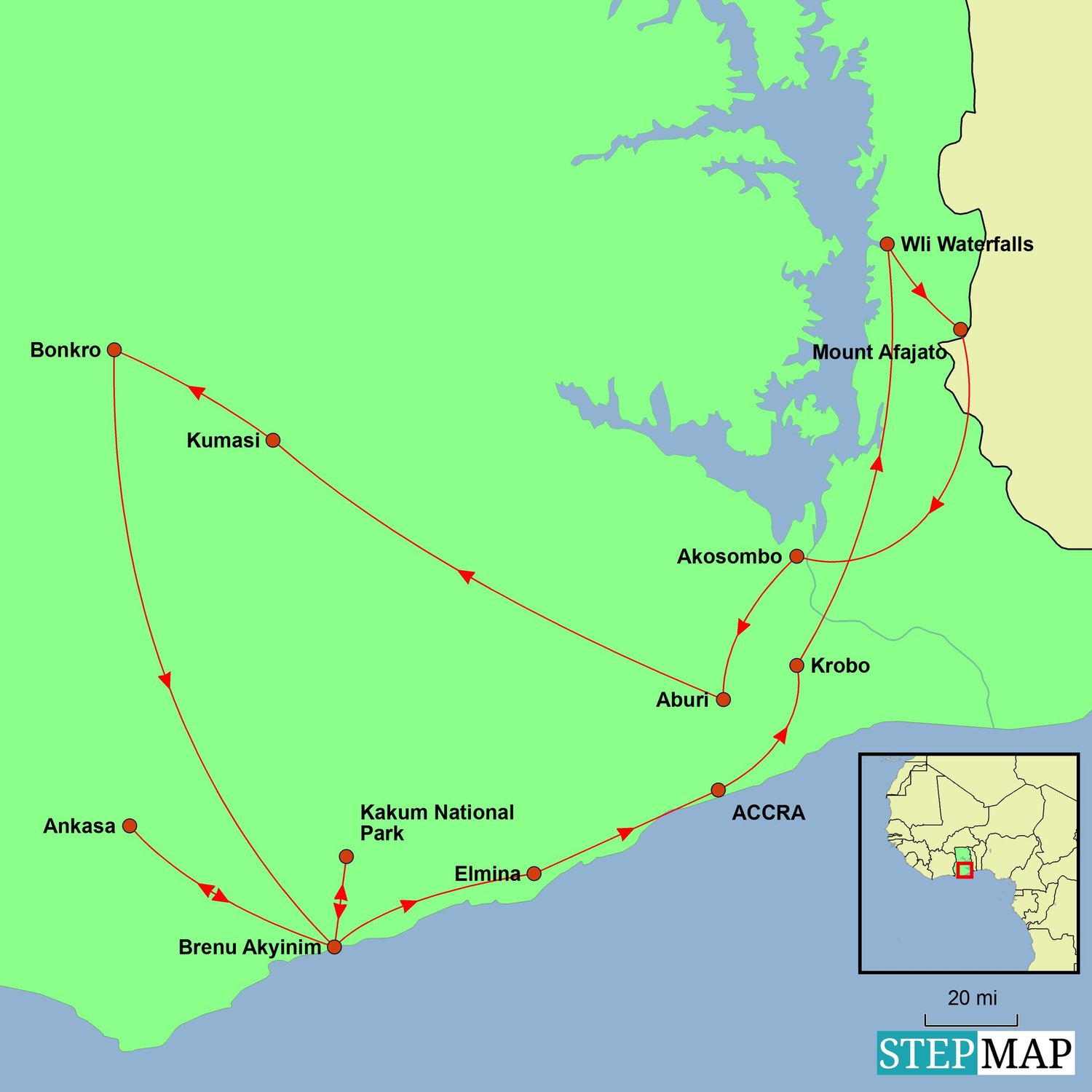
Price information
Check dates, prices & availability
Travel guides
Holiday information
Responsible Travel
Planet
This tour travels through some remote and often pristine environments, and we make a point of ensuring that we do not leave any permanent traces of our stay behind, making sure that we take all litter with us.In Boabeng Fiema Monkey Sanctuary we support local conservation efforts through the fees that we pay to enter the reserve. By bringing income to this region it encourages the preservation of wildlife – local people are able to see the value of the wildlife through the employment that the reserve provides, and are therefore discouraged from hunting. We include a visit to the fetish market in Lome, which is a traditional market selling animal parts for use in local spells and medicines. Although we realise that this may be controversial, this is a local market for local people, and would exist without the presence of tourism. We strongly discourage our clients from purchasing any of the items on sale. Nevertheless this provides a unique insight into an intriguing culture.
People
This tours travels through some very remote areas where we are privileged to spend time in the company of local communities. When visiting villages and settlements we make use of local guides from that region, who are able to explain to us the cultures and customs of the people and ensure that we do not unwittingly offend our hosts, many of whom have very complex social beliefs. This is especially important with the Somba people, who are traditionally wary of outsiders and have a very fragile existence. This also helps to provide employment and income for rural communities. We do not believe that we should simply visit these villages without making a financial contribution – it is only fair that they also benefit from the unique experiences that we offer to our travellers.In our pre-departure information we include guidelines about photography – this is particularly relevant in parts of Togo and Benin where some of the tribal groups are incredibly photogenic. Although many people are happy to be photographed, others are not, and we emphasise to our travellers the importance of respecting people’s wishes. Many people wish to be compensated for having their photograph taken. Although this is a complex issue we believe that it is only fair to offer this when requested. We do not however promote indiscriminate payment for photographs when it is not requested.
Our philosophy is to only use small and locally owned suppliers, meaning that the income remains within the country and creates a real economic contribution. We also feel that the passion inherent within such suppliers means that your experience will be enhanced. We also try to engage with our suppliers on an equal basis – getting the lowest possible price usually isn’t the best outcome for local communities and is ultimately unsustainable. We aim to always treat our suppliers fairly and with respect; they are after all part of the key to our success and to us working together is much more than just a business arrangement, but an ongoing relationship that we aim to ensure truly benefits everyone involved.
We believe that tourism is a double edged sword that needs to be wielded very carefully. Our philosophy is to have a limited amount of departures – usually between one and three a year - for each of our itineraries. By limiting our presence in areas where local culture can be quite fragile, we hope to avoid as much as possible the phenomenon whereby an area changes in character due to repeated and prolonged exposure to tourism. We want to visit an area as friends, not intruders and to ensure that what we see will also be there for others to enjoy for many years to come.
We only employ local staff and unlike many operators we believe that to send a foreign Tour Leader along to accompany your trip is an unnecessary burden on your wallet and our carbon footprint. This means your money stays in the area to benefit the local community. When possible we use local transport, (i.e. rail or bus) and we always use local restaurants, markets and shops and encourage our clients to interact both financially and socially with the communities that they are passing through. In doing this your travels are supporting and encouraging the development of local services.
We only work with operators who are as committed as we are to putting something back into the communities we visit. This may include giving a percentage of the profits from each tour to a foundation to help street children or local conservation projects. Furthermore, in order to allow our clients to make an informed decision on where a greater proportion of their money should be spent, we avoid including pre-paid full board meals where possible. Local restaurants and cafes then benefit.
Popular similar holidays
Cultural history holiday in Ghana
From US $750 - US $3500 14 days excluding flights
Authentic Ghana Eco, Culture, History and Wildlife Tours
Transatlantic slave trade tour, Ghana
From US $1880 - US $3025 8 days excluding flights
Historical and cultural tour of Ghana
Ghana, Togo & Benin tour, Ouidah voodoo festival
From £3599 13 days excluding flights
The magic of Benin's voodoo festival, plus Ghana and Togo











